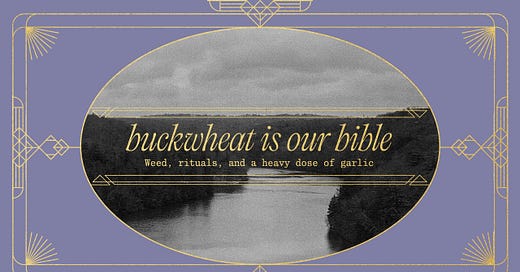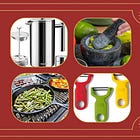Story #1: Buckwheat is Our Bible
A story about weed, rituals, and a heavy dose of garlic.
There are moments in my life that make me grateful suicide never worked out.
Not because life became easier, but because I would have missed the strange charm of meeting people whose weirdness felt like home, and all the maddening, confusing, heart-breaking, and glorious little disasters that make life feel worth sticking around for. It’s those moments that I’ve learned to lean into, chase after, and embrace.
It wasn’t a self-hatred or depression that pushed me to the edge. I was just in the wrong environment. I was raised in a small, rural town in conservative America. You know, the kind of place where people keep the same zip code for generations, either out of family obligation or because they peaked in high school.
It was a town where people helped out because it was the right thing to do. Prayer chains also served as the gossip train. Tradition was the blueprint — football, popularity, and Christ were the backbone. And you didn’t question anything, especially not the way things were done.
When it came to my peers, my curiosity about life felt like a malfunction to their revolving conversations about GPAs, college plans, and camp parties. Sure, I could blend in and play along, but it often meant dulling my thoughts and pretending like I didn’t feel like a caged animal.
Being made to sit in class made me itch with pent up energy and eventually, I’d break. I’d push my books off the desk so hard they’d ricochet off the wall. I’d walk out of class, hide during lunch, have panic-attacks, gasping for air until my face and hands were numb
The school wasn’t equipped for girls who “acted out,” and they sure as hell weren’t equipped for students who were hungry for real discussions. It boiled down to a glaring problem: a stark lack of diverse viewpoints. Everyone was cut from the same cloth, trapping us in a relentless cycle of regurgitated ideas. There was never room to challenge the stale narratives we were spoon-fed without being labeled a “libral” or “snob.”
I wanted to understand life. I wanted to know the core of its meaning, the reason behind everything, how things correlated to each other. Instead, when I pushed for something deeper, I’d be separated from everyone and sent to the counselor’s office or placed in in-school detention.
Naturally, I felt okay sharing my thoughts in the one place that felt safe — the psych ward. The layers of locked doors and shatter proof windows gave me the space to get out all of the questions.
Why weren’t teachers evolving their lesson plans throughout the years? If we had to make an effort to learn, shouldn’t they make an effort too? What was the actual point of life if we were going to just end up dead anyway? How can Christians preach about love and acceptance and then judge people when they got home? Does calling yourself a Christian absolve you from accountability? Why can I feel everything and nothing at the same time?
The psychiatrists understood that my desire for conversations beyond status or small-town drama wasn’t the problem. They understood that staying put and getting knocked up by eighteen wasn’t the kind of future I wanted.
They would nod through my explanations and scribble notes. They questioned my bulimia and were inquisitive about whether my racing thoughts ever contained ideation about harming myself or others. They had theories—hormones, depression, vanity, maybe even some teenage rebellion.
But not once did anyone consider ADHD.
Instead, they did what drug dealers do best: put me on anti-depressants because if they couldn’t answer the questions, they’d at least quiet them.
While my peers celebrated their college acceptances, I collected rejection letters. With limited options, I enrolled in the local satellite branch of a Big 10 University. It was a small campus of recent high school graduate misfits and adults who were changing their career plans. They’d accept anyone whose checks would clear, so my poor transcript wasn’t an issue.
I went from getting pushed through high school so they didn’t have to deal with me to having a 3.95 GPA with a thirty-one-credit course load. The classes were intellectually stimulating. I could ask questions and engage in conversations without feeling like a freak. I started to allow the curious and engaging part of myself that had been suppressed to see light, and for the first time, I began to feel a sense of hope that life could go somewhere beyond those county lines.
It was there that I befriended my sociology professor, the campus odd-ball who rode his bike to work, wore Bavarian shirts and conversed in abstract questions and reasoning. I gave his older kids the occasional piano lesson and enjoyed a natural connection with the couple over their family dinners. They welcomed me into their lives, embracing my quirks like they were old friends because they too, had always been out of place. It was the beginning of a long-time friendship that would span moves across the country, career changes, and even the tragedy of death.
The family was kindred spirits who were anything but traditional. They were eccentric, rejecting modernity in favor of an earthier lifestyle and drawn toward people with interesting points of view. Our inclination to have judgments came from our own baggage and a shared disdain for what society deemed ‘normal.’ We didn’t hate people, God, no. We were all somewhere on the spectrum, unable to follow social norms. We found it easier to be inquisitive about people and their lives as a way to make connections than to engage in superficial small talk.
We were easily excited by anyone willing to reveal inner thoughts of peculiar details; like the neighbor who complained about his wife not smelling enough like garlic. Any waft of weirdness like this was never ignored and immediately followed up by an ear-perked ‘ooooooo!’ with a flurry of eager, hand raising questions.
When did garlic become a kink? Is he going to tell her? How’s he going to do it? Subtly, with an all garlic laced meal, or will it be a direct confrontation, like an ultimatum? What about her? If she knew of her husband’s disappointment, would she do anything about it? Would she rub a clove behind her ear before climbing into bed? Which parts of her body did he wish smelled of garlic? Did he want it coming from her breath or was he interested in the more intimate parts? And how exactly would that work? Would she hold a bulb of garlic in her vagina like kegel weights or rub the labia like a piece of Pa amb tomaquet? Most important, how does she feel about this news? Does it change the way she sees her husband?
For most people, a garlic kink would be an awkward confession. For us, it was an invitation to ask better questions, to get to the essence of a person. In a WASP’s world, you’d never bring up taboo subjects much less probe your way to the core of them.
Social politeness has a way of maintaining distance between strangers and even family members, but for us, our dying curiosity pulled them in.
In our world, our version of social politeness was testing the waters with more engaging questions, each one digging deeper and deeper. And anyone willing to overshare got an immediate seat at the table.
My observation and interest extended to his strict and ritualistic eating habits; something he used to reconcile his rigid upbringing, but without the holier-than-thou performative pressure of church goers. Holy water might have had more meaning if it came from anyone other than a handy priest. Instead, he found his version of cleanliness and ritual in the food he ate—a pescatarian diet of whole, all-organic, unprocessed foods. Refined flours and sugars were the devil, replaced by pure forms of freshly ground flours from their German grain mill. Sweeteners came from date and maple syrup, but were used only on special occasions.
Their diet was so clean it would have made any Los Angeles transplant’s vegan, gluten-free wellness routine look like deep-fried ranch from the state fair.
The way they ate, food wasn’t just a thing to be consumed. It was something built, layered, coaxed into existence. Compared to the beige, dark beige, and light beige foods I was raised on, this felt like stepping into color for the first time. Even watching them make salad dressing with a tube of Dijon mustard was fascinating. What the hell was Dijon mustard? Since when did mustard come in a tube? Why did it say ‘Senf?’ Why was it going into the salad dressing? In my home, fresh salad dressing came from one of those dry packets you mixed with vegetable oil and vinegar. Here, garlic and dried oregano would be crushed with a mortar and pestle, then mixed with Dijon, balsamic vinegar, and olive oil to come together as a balsamic vinaigrette.
Breakfast was especially ritualistic. Monday through Saturday followed the same script: oats, solemnly processed in-home through the grain mill, baptized in filtered water and left to soak over-night. In the morning, whole-milk yogurt was stirred into the cereal with fruit and equal offerings of raisins and raw almonds. Most of time it was an apple. In the summer, fresh blueberries or strawberries were picked nearby on Amish land, but everyone’s favorite were the fresh mangoes, purchased in bulk from a city almost two hours away. Sundays were different: it was pancake day. Every Saturday night, an egg was ceremonially placed on the counter, and buckwheat was processed through the mill. In the morning, he made pancakes on a flat cast-iron skillet. We topped them with plain yogurt, unsweetened applesauce, and the faintest whisper of maple syrup. This was his version of the Sabbath and we ALL indulged in the sin.
The dinner bell was a hulking piece of wrought iron, bolted to the back porch column. It wasn’t just a bell but a declaration! An ear ringing gospel that announced dinner was ready to anyone within a ten-block radius. The kids, scattered around the neighborhood, would come tearing through bushes and yards like raccoons—shameless, hungry and unapologetic about wherever they’ve been.
Communing around salad, tofu vegetable stir-fry and brown rice, we held hands. Saying grace was less about words than about action. It was led by the youngest, a two-year-old whose eyes lit up as he proceeded to guide us in his version of a call and response prayer. Excited by the attention, he raised his little fists to the sky, shook them back and forth, and tilted his head side to side. It was obvious he was improvising, but the way he committed to the charade could have easily been mistaken for being touched by the Holy Spirit. We’d mimic him anyway, thankful he always kept it short and blessedly sweet.
These people were opening my palate and eyes to a whole new planet—one that was laid bare for the entire family to witness. My attempt to fit in was less graceful and more of an enthusiastic trial-and-error. Once, I shoved a whole bay leaf in my mouth and ate it like an artisanal cracker, finding not all herbs were created equal. When I noticed them politely pretending not to react, I realized that bay leaves weren’t meant to be eaten.
I committed to my faux pas. I chewed that fucker, swallowed it like it was my favorite part and made a mental note to always put it on the edge of the plate like they did.
Unlike their culinary restrictions, their parenting style was free of the neurotic hovering parents do today. Back then, other people were allowed to be involved in the child rearing process. There was far less violence, virtually no social media, and it was seen as healthy for kids to be around people with different backgrounds and points of view. We openly shared our thoughts without the fear of being cancelled… ah, the good ‘ole days.
For me though, I had an inkling parenthood was not for me.
The parents and I loved weed and smoked it frequently, usually from one of his handmade, wooden pipes. When the kids came in, smelling it on me, they asked, “You like to smoke the grasses too, like Papa?” jumping up and down with excitement as if they had just branded a new family member. Unsure if I should lie and warn them against the evils of marijuana or introduce them to one of God’s necessary creations, I landed on, “I suuuure do.” They were only seven and nine at the time, blissfully unaware of why anyone would want to smoke weed. They were free to create, free to day dream, free from monotony.
Later that night, around the fire pit, the kids grabbed long stalks of dried grass, held them in their mouths and lit the ends on fire. “We’re smoking the grass too!” they declared. That was the proof I’d be an unfit parent.
I prefer my mistakes to affect just me, maybe my partner, and the occasional unlucky friend or family member—not an entire generation destined for therapy, or worse, Christianity.
The weight of that kind of responsibility would crush my guilt-ridden conscience I was somehow blessed with. I’d be the kind of parent murmuring, ‘Do as I say, not as I do,’ while secretly hoping they wouldn’t follow either.
The kids were often told to ‘buzz off,’ to work out their problems independently of parental interference. When they did get into trouble, they were scolded with logic—an earnest attempt to peel away excuses and unveil some kind of confessional self-truth. A simple ‘I’m lazy’ or ‘I’m negligent’ would have sufficed nine times out of ten. Punishment wasn’t being paddled into submission or banished to their rooms without TV. Not that TV was ever a priority — it only had three of four channels and was tucked away in a cabinet in the corner of the living room. Instead, discipline meant reading articles and writing essays about what they learned.
It wasn’t just the kids who had structure. Everyone in the house had a role. There was always something to do, and I learned how to be useful. How to exist in someone else’s home without feeling like a guest. But without realizing it, I was building the kind of knowledge that would get me through someone’s kitchen door years later. How to cook brown rice, how to make salad dressing from scratch, how to maintain the rituals and habits people clung to like life rafts.
Every person moves to their own quiet rhythm, a pulse so subtle it fades into the background. We don’t just observe these rhythms; we absorb them, sync ourselves to them, let them shape the tempo of our own days without realizing we’ve fallen into step.
It’s not the grand gestures that tether us to one another, but the smallest, simplest repetitions — the smell of oatmeal at 8:30 in the morning, the coffee grinder humming at 10:00, the way a person’s absence lingers in the air when they leave the house for the day.
These moments aren’t just habits; they are the invisible threads that weave us into each other’s lives, stitching our days together in ways we never stop to name. And then, one day, the smell doesn’t come. The grinder stays silent. The air remains empty. And only in the stillness do we understand that it was never just background noise—it was gravity, holding us in place all along.
The years I spent with this family were a unique and profound time in my life, one that is often shadowed by the cruelty of hindsight and its insistence on bringing people back into focus with words and meaning you’ve only gathered with age. Only now, those connections have either frayed into the ethereal or vanished entirely, leaving only the emptiness that memories can momentarily fill.
If suicide had worked out, I would’ve missed the unbearable beauty of it all. The absurdity, the contradictions, the fleeing moments that never announce themselves but somehow become everything. Life doesn’t owe us meaning. It only gives us time, and most of it slips by unnoticed. But even in the mess, even in the sharpest moments of loss, something always pulls us forward. And for every time I’ve wanted to step away, there has always been another moment—unremarkable, unexpected—that made me grateful I stayed.
Credits:
Narrated by: Elaine T.
Sound Engineer: Max Lee
Written by: Anonymous Fork
Recipes:
Check out the recipes from this story.
Hot Tips:
Check out the hot tips from this story
Follow us on instagram: @the.anonymousfork
Join the discussion
In Buckwheat is Our Bible, food was the anchor. The daily act of grinding grains, soaking oats, carefully preparing each meal—it gave life a rhythm.
🗣 What’s a ritual you swear by?
Do you have a personal or family ritual that brings you comfort?
Have you ever created a ritual for yourself after feeling lost?
What’s a habit that started as something small but turned into something sacred?
Anonymous Fork's Substack is a reader-supported publication.















You're a great writer